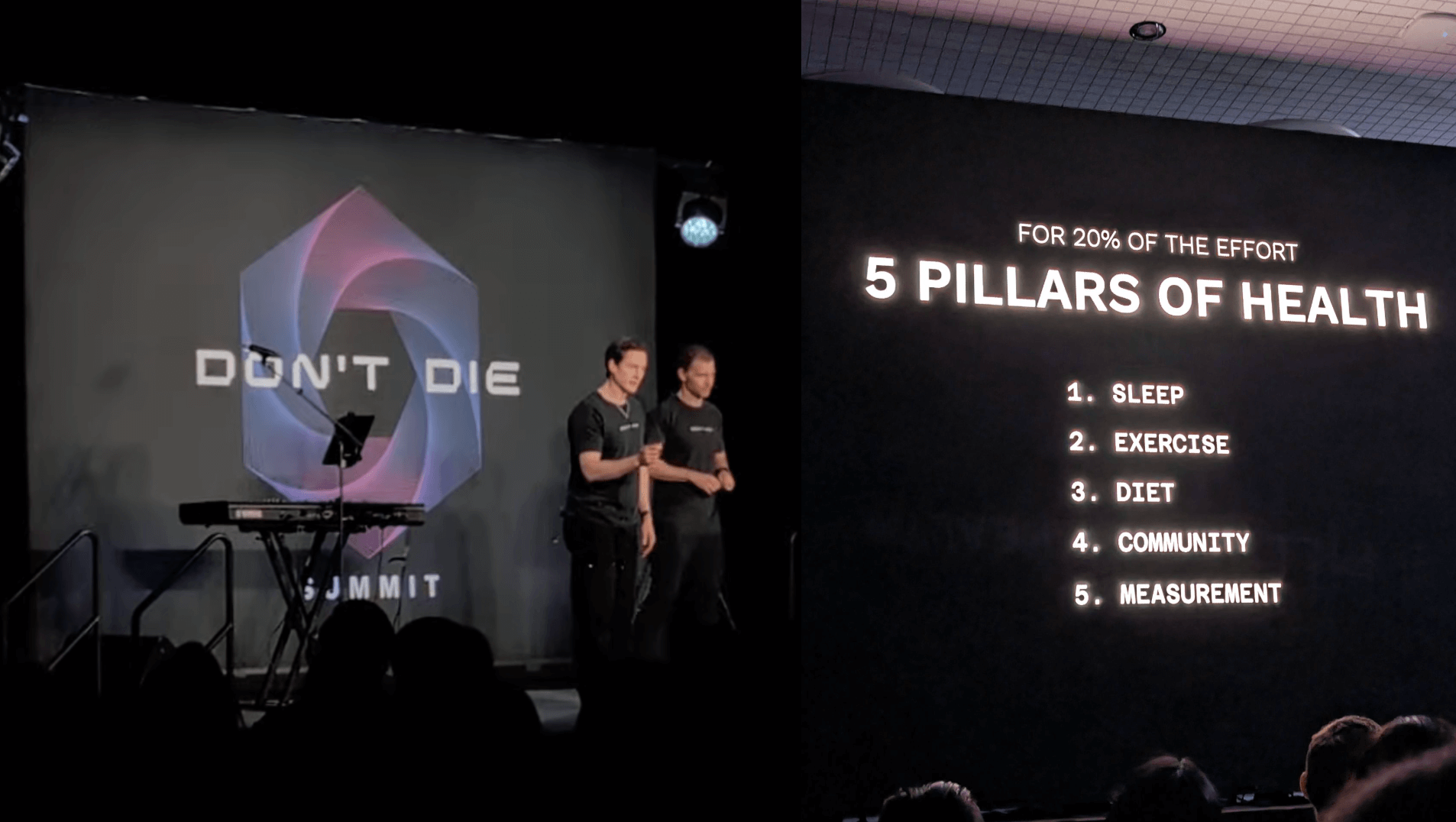A sleep protocol for high-performers
Discover why sleep is your most powerful performance tool. This guide distills expert recommendations from Bryan Johnson, Andrew Huberman, and Peter Attia into actionable steps that fit your busy life.
Table of Contents
What if the single thing you can do to feel healthier, be more productive, and think more clearly costs nothing, requires no prescription, and you're likely shortchanging it every single night?
Sleep. Consistent, 7-8 hours. Easier said than done.
After attending Bryan Johnson's Don't Die Summit in NYC, I realized that sleep is the #1 lever to get right as it affects everything else. Poor sleep directly impacts my productivity, dietary choices, and workouts. Getting adequate sleep has become one of my top priorities this year, as it influences all other aspects of my wellness routine.
To help get better sleep, I've synthesized the best strategies from Bryan Johnson, Andrew Huberman, and Peter Attia into this tactical guide specifically for those of us juggling career demands, possibly family life, and other busy routines.

What science tells us
Sleep isn’t just rest—it's your brain's essential maintenance reset. When I analyzed the research, I found that inadequate sleep directly compromises cognitive function, testosterone production, immune function, and emotional regulation.
For example, being awake for 18 hours gives you the cognitive impairment equivalent of being legally drunk (0.05% BAC). A single night of poor sleep reduces your natural killer cell activity by 70%, potentially compromising immune surveillance and increasing vulnerability to illness. This is particularly relevant for those of us who are busy—often sacrificing sleep for productivity, not realizing we’re sabotaging the very performance we’re trying to optimize.
Your sleep is governed by two main systems: circadian rhythm (your internal 24-hour clock) and sleep pressure (adenosine accumulation throughout the day). Mastering both is essential for optimal sleep.
Deep sleep, occurring predominantly in the first 1/3 of your sleep cycle, is when your brain clears metabolic waste through the glymphatic system and consolidates memories. REM sleep, predominant in the latter part of the night, enhances emotional regulation and creative problem-solving—both crucial for leadership and high performance.
Morning sleep protocol
The single most powerful action you can take for sleep optimization doesn't happen at night—it happens immediately after waking. Within 30-60 minutes of rising, expose your eyes to natural daylight for 10-30 minutes (depending on cloud cover).
This should be a non-negotiable part of our routine. This morning light exposure synchronizes your circadian clock, suppresses melatonin production, and triggers the cortisol awakening response that energizes you for the day.
Do this without sunglasses (regular eyeglasses or contacts are fine), and adjust duration based on conditions: 10 minutes on bright days, 20 minutes on cloudy days, and 30-60 minutes on very overcast days. If you live in a northern climate during winter, Huberman recommends investing in a 10,000 lux light therapy device like the Carex Day-Light Classic Plus.
Follow this with light movement (5-10 minutes of stretching or walking) and hydration. Delay caffeine consumption for 90-120 minutes after waking to leverage your natural cortisol rise and prevent mid-afternoon crashes.
Most importantly, maintain a consistent wake time (within 30 minutes) every day — including weekends. This regularity is more important than bedtime consistency, though both matter.
I’ve adopted getting sunlight into my morning routine. I get up early, and immediately hit the gym or run outside. I’m exposing myself to light, getting movement in, and delaying caffeine consumption until I start working.
Daytime sleep protocol
What you do during the day dramatically impacts sleep quality. Andrew Huberman and Bryan Johnson both emphasize strategic exercise timing: aim for at least 30 minutes of moderate-intensity exercise most days, but don’t perform intense workouts 3-4 hours before bed.
Your meal timing is critically important. Bryan Johnson discovered that eating his final meal 9.5 hours before bed (at 11 AM for his 8:30 PM bedtime) reduced his resting heart rate during sleep from 55-58 BPM to 47-49 BPM, improving sleep quality by approximately 30%. While this extreme approach isn't necessary for everyone, he recommends finishing your last meal at least 2-3 hours before bed and experimenting with earlier dinners.
Manage caffeine strategically. Its half-life is approximately 6 hours, which means consuming coffee 6 hours before bedtime is equivalent to drinking half a cup immediately before bed. Cut off caffeine at least 8-10 hours before sleep (Huberman suggests 12-14 hours for optimal results). I stop drinking coffee or caffeinated drinks at noon. Though, sometimes I’ll have green tea up until 3pm.
What about napping? If you need an afternoon boost, try Huberman's “non-sleep deep rest” (NSDR) protocol instead of caffeine. It’s a 20-minute yoga nidra meditation or a structured nap (under 30 minutes) before 3 PM to refresh without disrupting your nighttime sleep.
Another thing to avoid: Alcohol. Bryan Johnson emphasizes the importance of avoiding alcohol for better sleep, as it significantly compromises sleep quality. According to his data, consuming alcohol before bedtime can reduce sleep quality by up to 80%. To improve sleep, Johnson advises completely avoiding alcohol, especially in the evening.
For afternoon meetings or deep work, get another brief dose of natural light around sunset (5-10 minutes). This reinforces your circadian rhythm and helps regulate melatonin production later in the evening.
Evening sleep protocol
Two hours before bed, begin systematically reducing light exposure. This is when your tactical evening routine begins.
Start by dimming household lights and switching to warm-spectrum bulbs or red lights only. Use nightmode (orange tints) on your devices to eliminate blue light, or better yet, use blue-light blocking glasses (Ra Optics or BLUblox are top brands recommended by these sleep experts). I use these clip-ons. As goofy as I look, they help me feel more relaxed before bed.
Your body temperature must decrease by 1-3°F to initiate and maintain sleep. Peter Attia reports significant sleep improvements with sauna use 1-2 hours before bed (typically a 15-minute session at 198°F, followed by a cold plunge, and another 20-25 minute sauna session). If sauna access isn't available, a warm bath or shower 60-90 minutes before bed achieves a similar effect—the subsequent cooling aids sleep onset.
Implement a consistent 30-60 minute wind-down routine. This isn't just nice-to-have fluff—research shows it significantly reduces sleep latency and improves sleep quality. Effective activities include:
- Reading physical books (not on screens)
- Practicing mindfulness meditation (10-20 minutes). Either you will have a deep meditation, or fall asleep. Victory either way.
- Breathing exercises (physiological sighs work well: two inhales through the nose, followed by an extended exhale through the mouth)
- Gentle stretching or restorative yoga
- Listening to calming music or sleep-focused podcasts
What you absolutely must avoid during this time: news, social media, work emails, and stressful conversations. These trigger cortisol and adrenaline release, directly opposing your body's natural melatonin production.
I’ve started using my blue light blocking glasses around 8, stopping work around 9 or 9:30, and getting ready to fall asleep around 10:30.
For my dancer friends—let's start a movement to normalize day socials! 🤣
Setting up your environment
Your bedroom environment dramatically impacts sleep quality. Keep temperature between 60-67°F (15-19°C) — slightly cooler than most people find comfortable. This temperature range optimizes the natural drop in core body temperature needed for deep sleep. This is colder than usual. I've noticed that I prefer 68-70°F.
For temperature control, many point to the Eight Sleep's Pod mattress cover as the gold standard, allowing precise temperature regulation throughout the night. Alternatives include the ChiliPad or simply layering blankets so you can easily remove them if overheated.
Darkness should be non-negotiable. Install blackout curtains and eliminate all light sources, including LED indicators on electronics. If perfect darkness isn't possible, use a high-quality sleep mask (Manta Sleep makes the best contoured options that don't press on your eyes). I use the Alaska Bear sleep mask recommended by Peter Attia.
For sound management, use a specialized noise machine like the LectroFan (keep volume below 30 decibels) or high-quality earplugs. I use earplugs.
Invest in a supportive mattress and pillows appropriate for your sleep position. Side sleepers require thicker pillows to maintain spinal alignment, while back sleepers benefit from thinner pillows. I use the novaform costco mattress, and comfy sheets.
Supplements for better sleep
Approach supplements as enhancement tools rather than replacements for proper sleep hygiene. Huberman, Johnson, and Attia all recommend starting with one supplement and adding others gradually to assess individual effects.
Primary sleep-supporting supplements (taken 30-60 minutes before bed):
- Magnesium: Choose either threonate (145mg) or bisglycinate (200mg). Threonate crosses the blood-brain barrier more effectively, while bisglycinate causes less digestive upset. Brands: Thorne Research, Pure Encapsulations.
- Apigenin (50mg): A flavonoid found in chamomile that binds to benzodiazepine receptors, promoting relaxation without dependency issues. Brand: Double Wood Supplements.
- L-Theanine (100-400mg): Increases alpha brain waves and promotes relaxation without sedation. Avoid if you experience intense dreams. Brands: Jarrow Formulas, NOW Foods.
Secondary supplements (use 3-4 nights per week):
- Glycine (2g): Improves sleep quality by reducing core body temperature.
- GABA (100mg): Supports the primary inhibitory neurotransmitter in the brain.
What about melatonin? While melatonin is widely available, both Huberman and Johnson generally advise against its regular use unless you're dealing with jet lag or shift work. It's a hormone, and long-term use can disrupt your natural production. Focus on the behavioral and environmental factors first. Sometimes I take 1mg melatonin or half to help get me back to my sleep routine.
For most nights I use Magnesium Glycinate from Pure Encapsulations. On nights where I know I'm going to need extra help (like Sunday going into Monday), I'll use Magnesium, Apigenin, L-Theanine, and Melatonin around 9-9:30pm. A combo of all four help me to feel tired enough for sleep by 10:30.
Most importantly, track your sleep to identify patterns and optimize your approach. Use an Oura Ring, WHOOP, or smart watch to monitor:
- Sleep efficiency (aim for ≥85%)
- Deep sleep duration (target 1-2 hours)
- REM sleep (target 1.5-2 hours)
- Resting heart rate (should decrease during sleep)
- Heart rate variability (should increase during sleep)
I don't currently use a smart watch to measure sleep activity, but I'm on the market for one. Looking at Whoop 4.0 (Bryan Johnson uses this one), but according to this guy it's not the most accurate.
If you can't fall asleep within 20-25 minutes, leave your bed and move to another room. Engage in a relaxing activity like reading under dim light and return to bed only when you feel sleepy. This prevents developing an association between your bed and wakefulness.
For nighttime awakenings, try Huberman's “Mental Walk” technique: visualize walking a familiar route in detail to redirect focus from ruminating thoughts.
Wrapping it all up
Our culture places greater importance for work over sleep, and getting sleep is sometimes perceived as a weakness. Bryan Johnson says this is foolish. Treat sleep as your competitive advantage, not a luxury. As Johnson states, “Make sleep your #1 priority... identify as a professional sleeper.”
The four most impactful changes: consistent wake time with immediate sunlight exposure, cooler bedroom (60-67°F), complete darkness, and a 30-60 minute wind-down routine without screens.
Track your sleep but don't obsess over the data. Consistent implementation of these protocols will transform your cognitive performance, physical recovery, and emotional regulation—critical advantages for those of us with big goals and busy lives.
Nate Medina Newsletter
Join the newsletter to receive the latest updates in your inbox.
